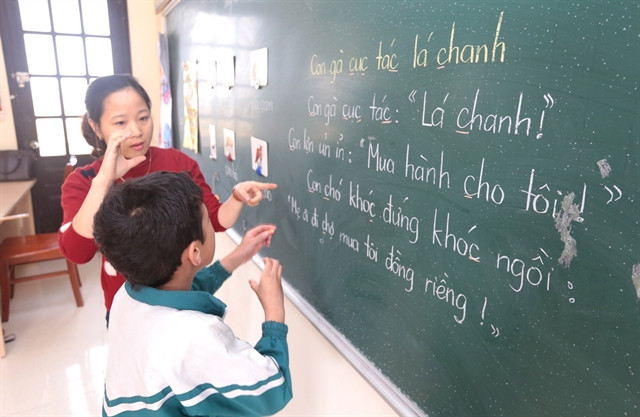 |
|
A teacher gives a student with disability a lesson at Tiên Lữ School of Rehabilitation and Vocational Training for People with Disabilities in northern Hưng Yên Province. |
The Ministry of Education and Training has been collecting public opinions on the planning of the education facility system and compiling specialised databases for people with disabilities, with the goal of ensuring that by 2030 all localities will have at least one inclusive education development support centre to serve individuals with disabilities.
Figures from the ministry showed that despite the expanding network of educational facilities for people with disabilities, the distribution of these centres remained uneven across regions.
Many localities lacked these educational facilities due to a shortage of strategic planning.
Reports by the National Special Education Research Centre showed that as of 2023, there were 14 inclusive education development support centres, 25 provincial-level specialised schools, and 23 district-level specialised schools across the country.
Among these, only 2.9 per cent of schools were designed to provide access for disabled children, and just 9.9 per cent had sanitary facilities suitable for people with disabilities. Only one sixth of primary schools and one tenth of secondary schools had teachers trained to provide inclusive education for disabled children, and only one seventh of kindergarten teachers were trained to care for and nurture disabled children.
Deputy Minister of Education Ngô Thị Minh said to improve opportunities for individuals with disabilities in education, the network of specialised educational facilities and inclusive education development support centres must be adequate in terms of structure, quantity and quality to meet the educational needs of people with disabilities in all regions of the country.
The specific goal would be to have at least one inclusive education development support centre in 50 per cent of localities across the nation by 2025 and 100 per cent by 2030.
There are many opinions regarding the issue.
The United Nations Children's Fund (UNICEF) representative in Việt Nam suggested that in addition to comprehensive solutions, there should be a strong emphasis on raising public awareness about inclusive education for disabled children.
The Việt Nam Blind Association recommended that individuals with disabilities should have opportunities to work at inclusive education development support centres. The Việt Nam Deaf Association proposed that the planning should pay attention to all levels of education to ensure that people with disabilities have opportunities for higher education.
Furthermore, some opinions highlighted the need for additional focus on individuals with autism and policies to enable disabled individuals to work in businesses.
Deputy Minister Ngô Thị Minh acknowledged the importance of these contributions, as feasible and convincing planning was essential for practical implementation.
Planning should have clear criteria for establishing specialised educational facilities for people with disabilities and must ensure a correct and comprehensive understanding of the roles and responsibilities of inclusive education development support centres, she said.
The education official also emphasised the interconnectedness and the challenges posed by planning and development of specialised databases for people with disabilities and the inclusive education development support centre system.
The ministry has conducted an initial assessment of the current situation and begun drafting the planning, she added.
However, feedback was required from representatives of relevant ministries and agencies, experts, as well as specialised education institutions. This was necessary for comprehensive and feasible planning, she said. — VNS